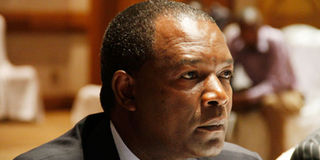MPs: CBK boss allowed banks cheap credit

The Central Bank Governor Njuguna Ndung’u created an environment for banks to access cheap credit from public coffers, Parliament was told March 6, 2012. FILE
The Central Bank Governor Njuguna Ndung’u created an environment for banks to access cheap credit from public coffers, Parliament was told Tuesday.
The details of the hands-off approach in managing the depreciation of the shilling were laid bare when the debate on the Parliamentary Committee that investigated the rapid decline of the shilling entered its second day.
Adan Keynan, the chairman of the committee and Ntoitha M’Mithiaru, who sits in the committee, said the regulator failed to make the lending rate at the overnight facility (the Discount Window) "punitive.”
Mr Mithiaru, a former chairman of the Kenya Bankers Association, told the House that the interbank lending rate was higher than the CBK window rate, and this motivated the banks to overlook the inter-bank rate. In August, 2011, the rate at the discount window was 19.3 per cent, while the interbank rate was 27.7 per cent, he said.
It is at this point that the turnover of the banks rose to Sh600 billion in 2011, against a turnover of Sh11 billion for 2010.
Though some MPs and banks questioned the rationale of adding the figures, the lawmakers who sit in the committee said the figures showing the colossal rise in the turnover was a pointer to some mischief by the bankers, and a lethargic regulator.
“At the centre of this activity, somebody was watching. That person is the regulator. Why did the Central Bank sit back and allow that?” posed Mr Mithiaru.
“The fingers are pointing to the banks, but because our committee could not narrow down on the banks, we pinpointed the weaknesses of the Central Bank governor and narrowed down on the governor”, Mr Mithiaru said.
Acrimony dominated the proceedings but Mr Keynan continued with the exposé saying that banks did not access the discount window as a “matter of last resort”, but simply abused it even as they hoarded billions in foreign exchange equivalent in their coffers.
He mentioned CFC Stanbic, KCB, Standard Chartered Bank, Citibank, Barclays Bank and Commercial Bank of Africa as among the banks that were hoarding Sh70 billion, Sh57 billion, Sh46 billion, Sh29 billion, Sh26 billion and Sh27 billion in their accounts respectively.
Mr Keynan warned that the maturity period of the Treasury Bills was coming up and Kenyans will have to pay for the money that the banks invested in the Bills at exorbitant prices.
“Which business can give you 32 per cent returns? All of us have been impoverished!” said Mr Keynan, as he called for the CBK governor to quit.
Acting Finance minister Njeru Githae had a tough time explaining the CBK position about the depreciation saying that the problem was the “threat of default” in Portugal, Greece, Ireland and Spain. He said the depreciation was as a result of high fuel prices, the huge current account deficit and the debt crisis in the euro zone.
But Joint Government Whip, Jakoyo Midiwo (Gem) who is among the members of Parliament’s Finance Committee, that were co-opted into the team that investigated the depreciation of the shilling, revealed that the International Monetary Fund had said that Kenya was not affected by the crisis in the Eurozone.
“The boss of IMF (Domenico Fanizza) met the Finance and Budget Committee today, and he told us, and I quote “Kenya is lucky that it was not affected by the Euro crisis”. Is the minister in order to mislead the House?” posed Mr Midiwo.
But Mr Githae stood his ground: “We can blame everyone else, but not governor Ndung’u; we can blame our appetite for imports but not governor Ndung’u. It is wrong to blame governor Ndung’u alone.”
Francis Nyammo (Tetu) opposed the report saying the depreciation was a “manifestation of problems in the economy” which ought to be fixed. He accused the committee members of “just looking for scapegoats” instead of addressing fundamental issues in the economy.
“Why do we want to think that the banks are doing anything wrong when they are in business? This is a blame game. We just want to bury our heads in the sand,” said Mr Nyammo.
He found himself in unfamiliar territory when John Mbadi (Gwassi) accused him of bringing down a bank. But Mr Nyammo, who acknowledged having a stake in the collapsed Kenya Finance Bank, said that he had no interest in the banking sector apart from “being a customer of a number of banks”.
The call to save the governor, gained momentum with Mwangi Kiunjuri, insisting that the report can be amended to remove all allegations against the governor, however veritable.
Shakeel Shabbir, a member of the committee, also noted that the report had exposed the cartels in the country’s economy, because the banks had made lots of money from the ineffectiveness of the Central Bank.
“These are money-making machines. There have been many billionaires made between now and August. There are now 40 billionaires and 40 million paupers,” said Mr Shabbir, who also sits in the Finance Committee.
He said the bankers lobby, Kenya Bankers Association, had exhibited “monopolistic tendencies”.
“The Central Bank is being run by a conglomerate of banks,” said Mr Shabbir.
Mr Mbadi, in his contribution, noted that the CBK had acknowledged a loose regulatory framework that opened the loopholes for the banks to raid the public coffers at the Central Bank.
“We’re paying Prof Ndung’u not to engage in politics,” said Mr Mbadi.
The debate continues.




